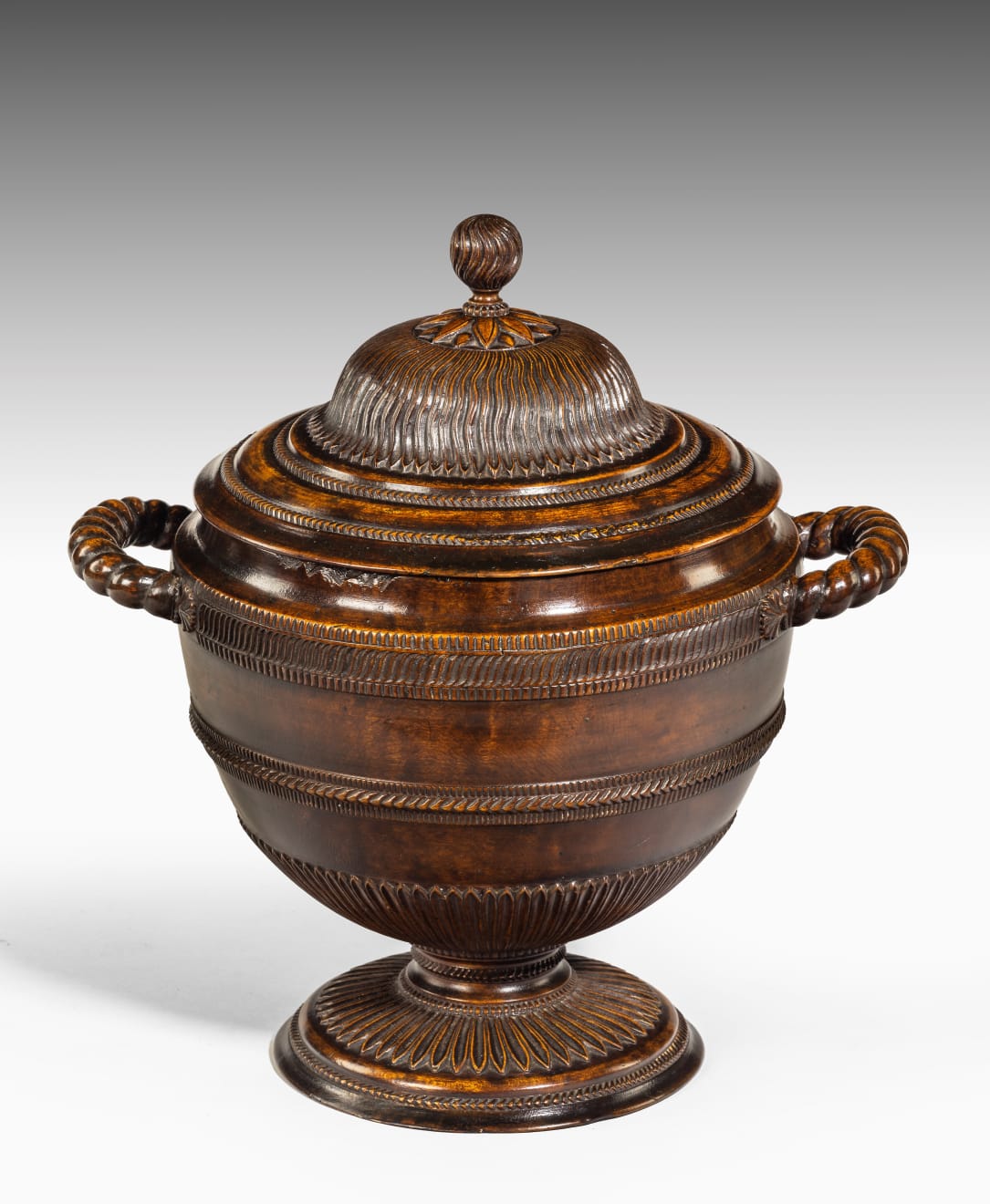Grand Tour Carved and Turned Fruitwood Neo-Classical Urn
ITALY, circa 1780-1810
31 x 35.5 cm
12 ¼ x 14 in
12 ¼ x 14 in
6761
Further images
Provenance
Made for the Berkeley Family at Spetchley Park, thence by descent until sold at Sotheby’s Spetchley - Property from the Berkeley Collection, 11th December 2019, lot 63.
With a leaf carved and turned lid, the finial restored, the turned body with rope-twist side handles anchored by shells and bands of fluting, with leaf carving and turning in...
With a leaf carved and turned lid, the finial restored, the turned body with rope-twist side handles anchored by shells and bands of fluting, with leaf carving and turning in the socle.
Spetchley Park as we see it today was commissioned by Robert Berkeley (1764-1845). The foundation stone was laid by his son on 3rd May 1811. The house was designed in the Palladian style by John Tasker (1738-1816), and built on an estate which had been in the Berkeley family since 1606.
Three generations of the Berkeley family completed major European Grand Tours in the late 18th and 19th centuries. The family took great interest in classic forms and as well as collecting pieces on their travels, they commissioned items inspired by the places they visited. Robert Berkeley (1713-1804) inherited the estate from his father, Thomas of Clytha and improved Spetchley, and aggrandised it significantly creating a chapel and dining room in the neo-classical style popularised by Robert Adam. He also significantly expanded the library, which included books with engraved plates of European classical landmarks from the Grand Tour.
The form of this exceptionally rare carved fruitwood urn is inspired by the marble funerary urns of classical antiquity. It is very unusual to find a carved wooden version of this classical form and interesting to note that both Adam, in the late 18th Century and Sir John Soane found inspiration in the antique Roman originals. At the time of the Spetchley sale the urn was located in the Dining Room amongst neo-classical silver of complimentary designs from both the 1770’s and 80’s and Regency pieces that would have been made for the new house which stands now. Being such a rare object, it is difficult to be sure if it would have been originally made for Robert Berkeley’s neo-classical dining room in the 18th Century or for his nephew to complement his Grand Tour objects in the private “Museum”.
Spetchley Park as we see it today was commissioned by Robert Berkeley (1764-1845). The foundation stone was laid by his son on 3rd May 1811. The house was designed in the Palladian style by John Tasker (1738-1816), and built on an estate which had been in the Berkeley family since 1606.
Three generations of the Berkeley family completed major European Grand Tours in the late 18th and 19th centuries. The family took great interest in classic forms and as well as collecting pieces on their travels, they commissioned items inspired by the places they visited. Robert Berkeley (1713-1804) inherited the estate from his father, Thomas of Clytha and improved Spetchley, and aggrandised it significantly creating a chapel and dining room in the neo-classical style popularised by Robert Adam. He also significantly expanded the library, which included books with engraved plates of European classical landmarks from the Grand Tour.
The form of this exceptionally rare carved fruitwood urn is inspired by the marble funerary urns of classical antiquity. It is very unusual to find a carved wooden version of this classical form and interesting to note that both Adam, in the late 18th Century and Sir John Soane found inspiration in the antique Roman originals. At the time of the Spetchley sale the urn was located in the Dining Room amongst neo-classical silver of complimentary designs from both the 1770’s and 80’s and Regency pieces that would have been made for the new house which stands now. Being such a rare object, it is difficult to be sure if it would have been originally made for Robert Berkeley’s neo-classical dining room in the 18th Century or for his nephew to complement his Grand Tour objects in the private “Museum”.










